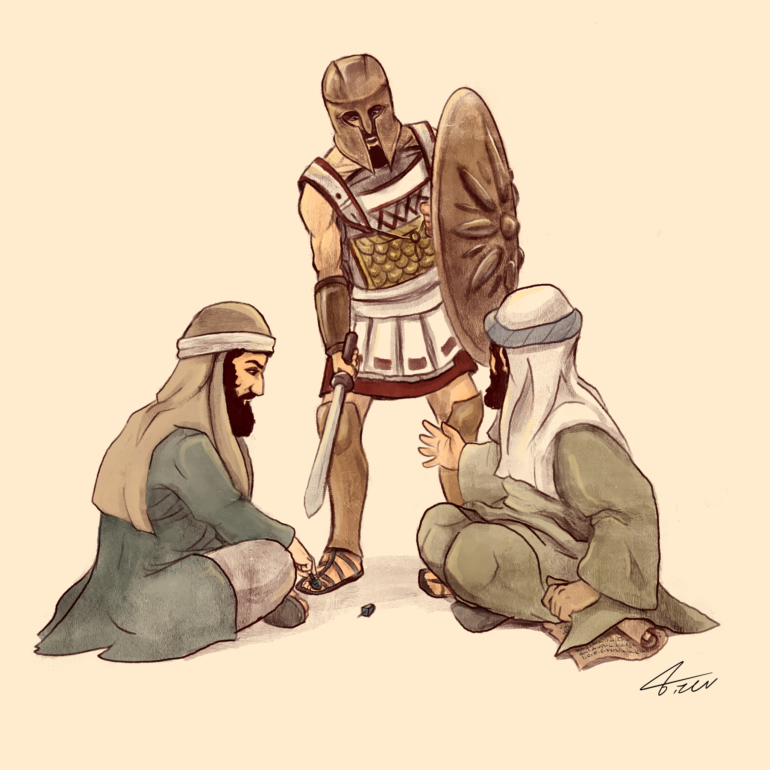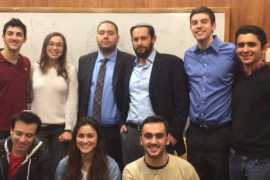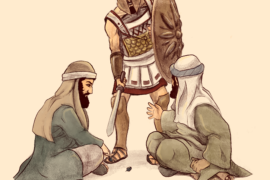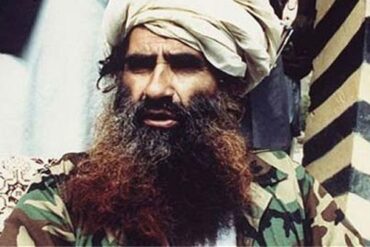The fifth chapter of a podcast series on the first Book of Maccabees.
For more content from VISION Magazine, subscribe to our newsletter and follow us on Twitter @VISION_Mag_, Facebook and YouTube. If you haven’t already, don’t forget to subscribe to our podcast on SoundCloud, iTunes, Stitcher, TuneIn, or Spotify and leave a rating and review to help us get our message out to a wider audience!
To support the podcast, head over to our PayPal portal and be sure to write a note that your contribution is for the podcast.
Hosted by: Robert Goodman
Transcript:
Shalom Aleikhem! And welcome back to Sefer Maccabim!
Last time we learned about the Maccabees’ miraculous victories at Emmaus and Beit Tzur, how they marched forth to liberate Yerushalayim while Lysias is up north in Antioch reorganizing the Seleucid army, and purified and rededicated the Beit HaMikdash in an eight day ceremony.
By now news of this Jewish victory has reached the non-Jewish nations. Now how do you think they feel when they hear the Jews have reclaimed their holy city? Do you think they’re happy and want to congratulate us? Of course not! Who likes it when Jews are successful? They immediately set about trying to rise up against us and undo our victory. In fact, we see this pattern unfolding across literally the entire gamut of Jewish history, how the whole world always gets angry at Jewish success and tries to rise us to undo it (except perhaps in the days of King Shlomo).
Let me explain: In the book A Tzaddik in our Time, the biography of Rav Aryeh Levine, the tzaddik of Yerushalayim, by Simḥa Raz, the following incident is recounted: The day after Yerushalayim was liberated in 1967 two members of Knesset called on Rav Aryeh and greeted him, “Mazal Tov! The Kotel is in our hands!”
When the rejoicing died down, Rav Aryeh said, “now we have to pray for heaven’s mercy.”
The members of Knesset asked him why, and he replied: “In Parshat Lekh Lekha, the Torah tells of a brilliant war fought and won by Avraham. Four kings had won a battle against five kings, and had taken captive Avraham’s nephew Lot (B’reishis 14:12). With merely 318 men, Avraham attacked the four kings and defeated them, and set his nephew free.
What do we read right after that?
“After these things the word of HaShem came to Avram in a vision, saying ‘Do not be afraid! I am your shield.'”
Now, asks Rav Aryeh, why did Avraham need this reassurance not before he went out to battle, but after this stunning victory?
The answer, he says, is simple: “After so resounding and astounding a triumph in battle, Avraham was certain that the nations all around him would not take it quietly. They would be stirred to their roots and would probably unite against him to undo his victory. So he needed the Almighty’s assurance. It is the same today. The nations will not accept Israel’s victory calmly. They will not consent to have the holy sites remain in our custody. Now, like Avraham, we need heaven’s mercy for than ever.”
Sure enough, shortly after the Six-Day War, the pressure by the great powers of the world began for Israel to withdraw from the territories liberated in the war. As Shmuel Tamir, one of the members of Knesset, later recounted, “Rav Aryeh had indeed a clearer, more sober view in political matters than we did.”
In short, no one likes a Jewish victory, and it seems the other nations will do anything to either prevent us from achieving them, or to undo the victory once it occurs. Even the nations Moav and Midian, who were sworn enemies, united to hire Bilaam to curse us after Moshe defeated the giants Siḥon and Og. There’s nothing quite like hatred of Jews to bring enemies together,
Anyway, the Ḥanukah story is no exception to this rule. The non-Jewish nations are eager to crush the Jews. But while they can’t reach Yehuda and his men in Judea itself, fortunately for them there are nearby targets who are a lot more reachable and a whole lot less powerful. I’m talking about the Diaspora Jews who never returned to Eretz Yisrael when Ezra the Scribe sent out the call to return after our exile in Babylon.
Throughout the entire era of the second Beit HaMikdash there are unfortunately many Jews living outside the land of Israel, in countries like Syria, Egypt and Babylon itself in the old Persian Empire. And combine Yehuda’s miraculous victories in Judea with the seething anti-Semitism of the surrounding nations, and life for a Diaspora Jew quickly becomes extremely dangerous as the non-Jewish nations turn on their Jewish populations and start killing and destroying them.
One of these countries who turn on their Jewish population is Gilad, which is located east of the Jordan River. The non-Jews gather together to slay all the Jewish residents, and the Jews living there are forced to barricade themselves in a fortress. They then send a message to Yehuda HaMaccabi, pleading: “Our non-Jewish neighbors have raised an army against us being led by a general named Timothieus. We are trapped in this tower in Gilad, and the army is laying siege to it and preparing to come in and slaughter us. They have already slain a thousand Jewish men and carried the wives and children away into captivity. Please come and save those of us who are left before it’s too late!”
Yehuda has not yet finished reading these letters when messengers with torn garments arrive from the Galilee, the mountainous region north or Judea where Jews and gentiles live side by side. These messengers bear the news that the gentiles living in Akko and Tyre and Tzidon and the entire Galilee, are all marching south to destroy us.
Yehuda, who prior to this was busy fighting battles against other nearby enemy populations including Edom and Ammon, is now faced with two pressing matters at once. Firstly, he has to head east to rescue the besieged Jews in Gilad, but he also has to protect Judea from the swarm of gentiles descending on the country from the north.
He decides to split his army up, and tells Shimon HaTassi, his older brother: “You take three thousand men and head north to fight the army coming from the Galilee. I, together with our youngest brother Yonatan, will take eight thousand men and head east to save the Jews of Gilad.”
Although the text has so far only mentioned Yehuda as leading the Jews into battle, all five sons of Matityahu are not only Talmidei Ḥakhamim but also outstanding warriors and more than worthy of commanding the Jewish soldiers in battle. As the Maccabean revolt progresses, we will see the other brothers take a much greater role in commanding the Jewish forces.
So Shimon marches north with his troops, Yehuda and Yonatan march east with theirs, and in the meantime Yehuda appoints two Jewish commanders, the first named Yosef ben Zekharia and the second named Azaria, with strict instructions to watch over the people in Judea and not to make war against the Seleucids until they return.
Shimon arrives in the Galilee and fights many successful battles against the goyim there; he and his men kill around three thousand of them, and the remainder flee into Akko and shut the gates behind them (Akko, on the northern Israeli coast, was then a walled city, and another significant event in our story is going to take place at this very same spot, at the gateway to the city).
Meanwhile, Yehuda and Yonatan with their men march east into the Gilad, and have crossed the Jordan River and been journeying into the desert for three days. Then they meet a people known as the Nabatians. The Nabatians were a Semitic people who lived in and around the Arabian Desert for around a thousand years, from around the height of the Persian Empire until the advent of Islam. They speak peacefully with the Maccabees, and inform them of the dire situation the Jews of Gilad are in; how they have been forced to barricade themselves in various fortresses in the different cities across the region, and how the goyim are planning to break down the fortresses and massacre all the trapped Jews in a single day – in fact, the very next day.
Yehuda sees he has no time to lose and immediately embarks on a campaign to destroy the cities of Gilad and save the Jews from the fortresses. First he conquers a city named Botzor, and upon approaching the fortress he sees men bringing ladders and battering rams and the like to break into the fortress and slay the Jews inside. The Maccabees blow their shofars and cry out to HaShem, and lunge straight into battle.
By this time, the reputation of Yehuda and his army has spread worldwide, and when the army of Timothieus see who it is that’s coming to fight them, they realize, “oh shoot, it’s the Maccabi” and start running for their lives. Naturally Yehuda does not simply allow them to waltz off like that, and he and his men kill around eight thousand of them. Then Yehuda goes on to conquer the city of Mitzpa, and all the remaining cities in the Gilad.
Timothieus gathers a much larger army to fight the Jews, and even goes as far as to hire the local Arabians to swell his forces. They camp against the Jews on the opposite side of a river (I don’t know which one, sorry about that) and Timothieus addresses his troops: “If when Yehuda gets here, he is afraid to cross over the river to fight us, that’s a sign he’s afraid of us, and we can cross the river and be confident of smashing him. But if he crosses over to us without fear, then we’re all dead.” (He doesn’t use exactly that choice of words but you get the idea)
What Timothieus doesn’t know, however, is that Yehuda sent spies into his camp who now return and tell him exactly what Timothieus said.
So sure enough, when the Jewish army approaches the river, Yehuda crosses over first and all his men cross over after him. Obeying their captain’s words, the soldiers of Timothieus lose heart, drop their weapons, and flee the battlefield to a pagan temple in a place called Carnayim. However, the Maccabees find them there and burn the temple along with all those inside it.
It’s another set of miraculous victories for Yehuda and his men, in which they manage to save every single one of the besieged Jews in Gilad. What happens to them? The Maccabees know what happened two hundred years ago in Persia, where even though Diaspora Jewry is spared from complete annihilation by a hair’s breadth, most of them don’t learn their lesson and continue living outside the land. Yehuda and his men are not going to let them make the same mistake. They bring the Jews from Gilad back with them to be settled in Judea as they begin the long trek home.
On the way back, they come to a great fortified city named Ephron, which is so big that they can’t travel around it left or right; they need to pass through the middle of it. However the inhabitants would not let them enter, shutting them out and barricading the gates with stones. Yehuda sends a message to them, saying, “let us pass through your city and not one of us shall do you any harm, we will only pass through on foot.”
But to no avail; the inhabitants refuse to open up the gates for them.
Does this sound familiar? You might remember that more than a thousand years previously, when Bnei Yisrael are in their last year in the Sinai wilderness and approaching Eretz Yisrael, Bamidbar chapter 20 recounts how Moshe sends emissaries to the king of Edom requesting permission for Bnei Yisrael to pass through their land on the way to their own land, even offering to pay for any food or drink they might consume on the way. However the king of Edom not only refuses, but sends out his mighty army to attack Bnei Yisrael! The similarities between these events aren’t perfect, however, because Bnei Yisrael are forced to turn away from Edom and find another route, on account of HaShem having given the land of Edom to Esav’s descendants until the days of Mashiaḥ.
Yehuda, however, is under no such restriction, and when the people of Ephron refuse to cooperate, the Maccabees assault the city gates for a full day and night, until they are able to break into the city. Once inside, they slay all males with the sword, take the spoils they find there, and march straight through the city over the corpses of the inhabitants who refused to let them in.
Once through the city, they face a long trek across the desert until they arrive at Beit She’an, but Yehuda never stops encouraging his people the entire way until they arrive safely back within the borders of Judea, where the local Jews joyously flock to him to welcome him back. So they go up to the Beit HaMikdash in joy and gladness and offer korbanot to express thanks to HaShem, for they rescued every surviving Jew in Gliad and not one Jewish soldier was killed. What a miracle!
Now earlier on I mentioned how Yehuda appointed the Jewish commanders Yosef ben Zekharia and Azaria to keep watch over Judea while they were away. However the text tells us how while Yehuda and Shimon were away fighting their battles, word of their victories filters back into Judea, and the two commanders hear about their incredible successes in battle. Inspired, they decide to go out to battle themselves against the goyim still living nearby, and earn a great reputation for themselves too. However, in doing so they are violating Yehuda’s orders, because he specifically commanded them solely to look after Judea, and specifically adjured them not to fight any more battles until his return. Yosef and Azaria violate his orders and lead some of the Jewish men to Yavne, a city on the coast outside Judea proper, where many non-Jews live.
Unbeknown to them, the Seleucid general Gorgias is in the city, and when the Jews approach he leads a number of them out of the city to fight them. Shocked, Yosef ben Zekharia and Azaria turn to run, but Gorgias pursues them across the plain as far as the borders of Judea, where the mountains begin, and the mercenaries succeed in killing around two thousand Jews. It’s a terrible and needless loss, simply because they didn’t follow the Maccabi’s orders.
The final verses of the chapter describe how after returning to Judea, Yehuda leads his men on a few more conquests, including against the descendants of Esav in Ḥebron, and against the Philistines in Ashdod, where he pulls down their altars and burns their idols with fire.
This concludes chapter 5, in which some of the main things we saw were a dramatic upswing in anti-Semitism following the liberation of Yerushalayim, Yehuda’s miraculous campaign to save the trapped Jews of Gilad, and the reckless excursion of Yosef ben Zekharia and Azaria. We’ll resume next time with chapter 6, in which we find out what Antiochus Epiphanes has been up to all this time and what happens when the Seleucids come against the Jews with a new weapon – the war elephant.





